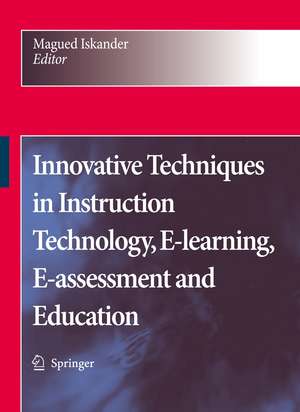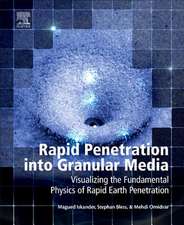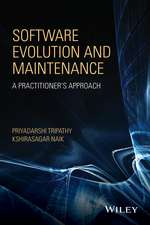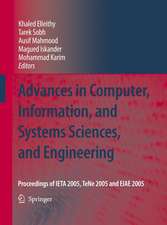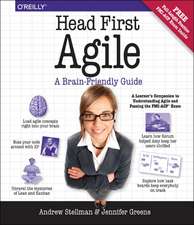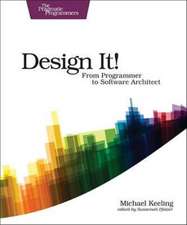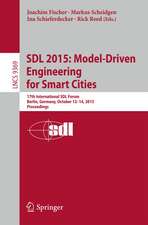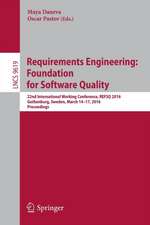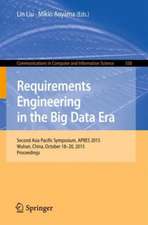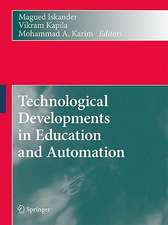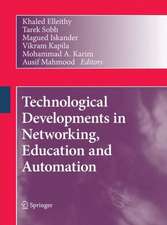Innovative Techniques in Instruction Technology, E-learning, E-assessment and Education
Editat de Magued Iskanderen Limba Engleză Paperback – 30 noi 2010
| Toate formatele și edițiile | Preț | Express |
|---|---|---|
| Paperback (1) | 1306.40 lei 43-57 zile | |
| SPRINGER NETHERLANDS – 30 noi 2010 | 1306.40 lei 43-57 zile | |
| Hardback (1) | 1308.39 lei 43-57 zile | |
| SPRINGER NETHERLANDS – 2 sep 2008 | 1308.39 lei 43-57 zile |
Preț: 1306.40 lei
Preț vechi: 1633.00 lei
-20% Nou
Puncte Express: 1960
Preț estimativ în valută:
250.06€ • 271.71$ • 210.19£
250.06€ • 271.71$ • 210.19£
Carte tipărită la comandă
Livrare economică 21 aprilie-05 mai
Preluare comenzi: 021 569.72.76
Specificații
ISBN-13: 9789048179749
ISBN-10: 9048179742
Pagini: 620
Ilustrații: XVII, 601 p.
Dimensiuni: 193 x 260 x 33 mm
Greutate: 1.37 kg
Ediția:Softcover reprint of hardcover 1st ed. 2008
Editura: SPRINGER NETHERLANDS
Colecția Springer
Locul publicării:Dordrecht, Netherlands
ISBN-10: 9048179742
Pagini: 620
Ilustrații: XVII, 601 p.
Dimensiuni: 193 x 260 x 33 mm
Greutate: 1.37 kg
Ediția:Softcover reprint of hardcover 1st ed. 2008
Editura: SPRINGER NETHERLANDS
Colecția Springer
Locul publicării:Dordrecht, Netherlands
Public țintă
ResearchCuprins
1. Development Of Online Internet Laboratory (Online I-Lab)/ A.Salihbegovic, S.Ribic. 2. E-Assessment Tool/ A.M.Rashad et al. 3. Developing Educational Applications using Adaptive e-Learning Model/ A.Balla, A.Sarirete. 4. Web Laboratory Experiences for Elearning/ R. RESTREPO et al. 5. Development and Implementation of an Information Server for Web-based Education in Astronomy/ A. Alegre et al. 6. Using Graphing Calculators for Teaching Advanced Calculus Courses/ A.Y. Vaninsky. 7. Systemic Design Of Instruction On Achieving The Goals Of Undergraduate Level Education In Universities/ A.Kirigha, N.-Abooki. 8. A Systems Model for Authentic Pedagogy Conceptualizing a Scaleable, University-wide Production Curriculum/ A.T. Brown III. 9. Evaluating the Usability of the Mobile Interface of an Educational Website/ F. J.Diaz et al. 10. Enhancing High School Science Through Sensor-Based Lab Exercises/ A.Popichak. 11. Blackboard Adoption and Adaptation Approaches/A.Narwani & M.Arif. 12. An Empirical Study of Product Metrics in Software Testing / Y.Singh et al. 13. A Dual-Mode Collaborative Teaching and Learning Classroom Environment/ C. N. Thai. 14. Can Multicore Processing Learn from Arithmetic Concepts?/ C.Mueller. 15. Come Play/ C.Caulfield, S. P. Maj. 16. A Tool to support Self-Education in a Lifelong Learning/ D.Baziukaite et al. 17. Postgraduate distance e-learning programme on IT in Construction/ D.Rebolj. 18. A Hybrid Lab for Evaluation of Analog ASICs / M.E. Auer, D.Garbi Zutin. 19. Blogging from the Top/ D.C. Wyld. 20. NP-Hard Graph Problems’ Algorithms Testing Guidelines/ D.Kumlander. 21. Pattern-Based Usability Evaluation of E-Learning Systems/ D.Zub, E.Eessaar. 22. Computerized Education/ G.G. Kuleshov. 23. E-Education Over Homogenous Network/ E.Küren, A.Cellatoglu.24. From Software Engineering to Enterprise Engineering/ E.Ortner. 25. On Translation-Based Design of UML Profiles/ E.Eessaar. 26. Was Dyslexia used to order the Alphabet?/ E.Hibbs. 27.Construction of Assessments with Double Adaptation Processes/ H.G. Barbosa León et al. 28. A Study on How Software Engineering Supports Projects Management/ M.-I.Sanchez-Segura et al. 29. Multi-variant assignment generation and assessment techniques/ G.I. Ankoudinov et al. 30. Critique of Traditional Statistical Tests in Asset Pricing Models/ H.Lin. 31. Impact of Short Sale Constraints on Pricing of Restricted Stocks/ H.Lin, Z.Zheng. 32. Blogfolios for Student-Centered Reflection and Communication/ H.Hao Yang. 33. Innovative Online Course using an Integrated Virtual Reality Based E-Learning Tool with Course Management Tool/ H.El-Mounayri et al. 34. Understanding Math Concepts through Computer-Modeled Virtual Objects/ J. Trujillo et al. 35. Knowledge Control Model of Distance Learning System on IMS Standard/ H. Kravtsov, D. Kravtsov. 36. Issues and Difficulties in teaching Novice computer programming/ I.T. Chan Mow. 37. Activity Theory for Designing Ubiquitous Learning Scenarios/ J.An. 38. An Inexpensive Approach for a Scalable, Multi-Boot Computer Lab/ J.D. Feher and K.Bhandari. 39. Lessons from the e-Learning Experience in South Korea in Traditional Universities/ D.Lee et al. 40. Some Innovations for Keeping an e-Learning System Alive/ J. López-Cuadrado et al. 41. Applying a Methodology for Educating Students with Special Needs/ J. L. Fuertes et al. 42. Evaluation Framework of Hypertext Access for Program Comprehension Support/ J.Koskinen. 43. A Model for Multiplayer Interactive Games in Cellular Wireless Environment/ V.P. Chandu, K.Singh. 44. An Evolutionary Algorithm for QueryOptimization in Database/ K.Asghari et al. 45. Cooperative Training Initiative/ K.S. Rabayah, B.Sartawi. 46. Contribution to the Research and Education of Innovation Engineering and New Product Development at the University/ K.Zgodavova et al. 47. Our Stations for Teaching Programmable Devices/ K. M. Noga, M. Radwanski. 48. Implementation of learning objects using J2ME/ L.Ramos de
Textul de pe ultima copertă
Innovative Techniques in Instruction Technology, E-Learning, E-Assessment and Education is a collection of world-class paper articles addressing the following topics:
- E-Learning including development of courses and systems for technical and liberal studies programs; online laboratories; intelligent testing using fuzzy logic; evaluation of on line courses in comparison to traditional courses; mediation in virtual environments; and methods for speaker verification.
- Instruction Technology including internet textbooks; pedagogy-oriented markup languages; graphic design possibilities; open source classroom management software; automatic email response systems; tablet-pcs; personalization using web mining technology; intelligent digital chalkboards; virtual room concepts for cooperative scientific work; and network technologies, management, and architecture.
- Science and Engineering Research Assessment Methods including assessment of K-12 and university level programs; adaptive assessments; auto assessments; assessment of virtual environments and e-learning.
- Engineering and Technical Education including cap stone and case study course design; virtual laboratories; bioinformatics; robotics; metallurgy; building information modeling; statistical mechanics; thermodynamics; information technology; occupational stress and stress prevention; web enhanced courses; and promoting engineering careers.
- Pedagogy including benchmarking; group-learning; active learning; teaching of multiple subjects together; ontology; and knowledge representation.
- Issues in K-12 Education including 3D virtual learning environment for children; e-learning tools for children; game playing and systems thinking; and tools to learn how to write foreign languages.
Caracteristici
All communications between the authors, reviewers, and conference organizing committee were done online, which permitted a short six week period from the paper submission deadline to the beginning of the conference PowerPoint presentations, final paper manuscripts were available to registrants for three weeks prior to the start of the conference. The conference platform allowed live presentations by several presenters from different locations, with the audio and PowerPoint transmitted to attendees through the internet, even on dial up connections Attendees were able to ask both audio and written questions in a chat room format, and presenters could mark up their slides as they deemed fit The live audio presentations were also recorded and distributed to participants along with the PowerPoint presentations and paper manuscripts within the conference DVD
